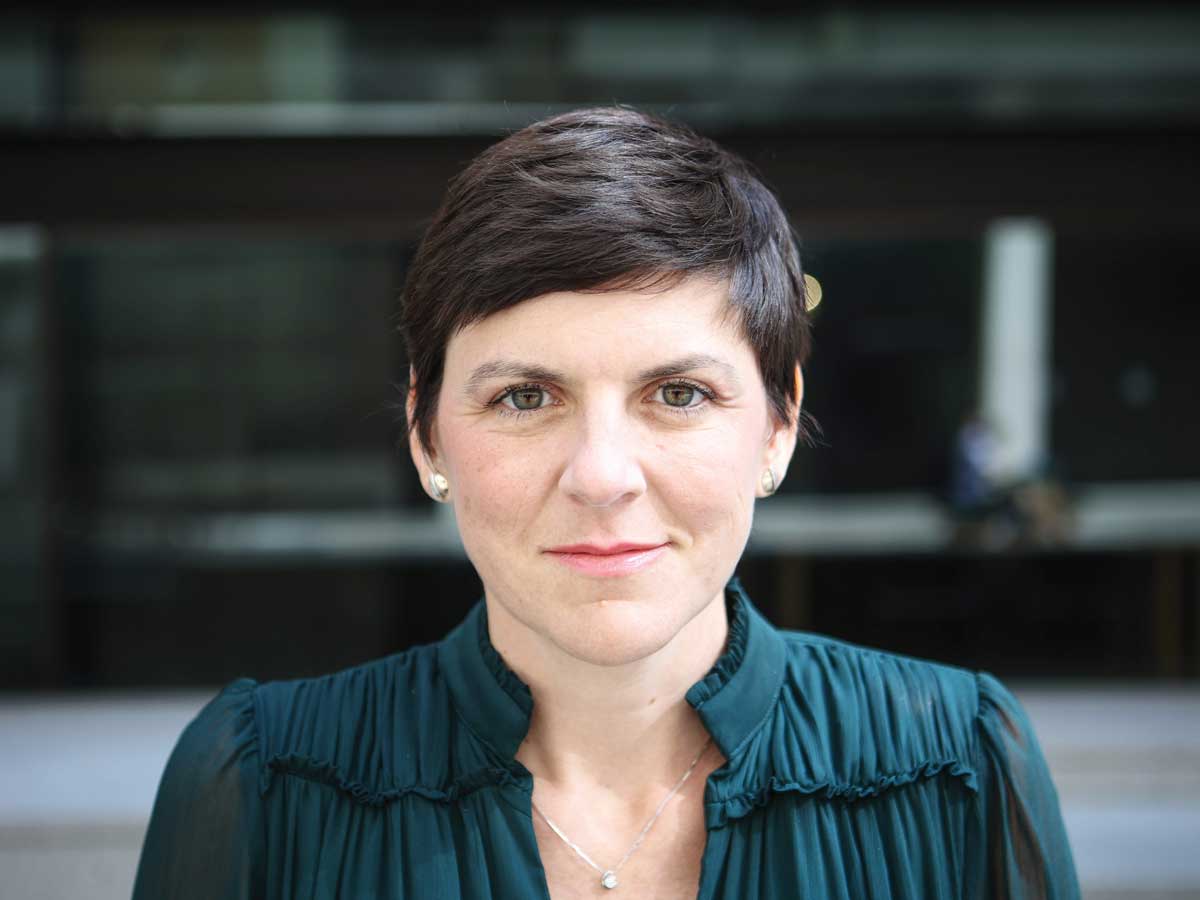
This CPA uses her experience with cancer to help others
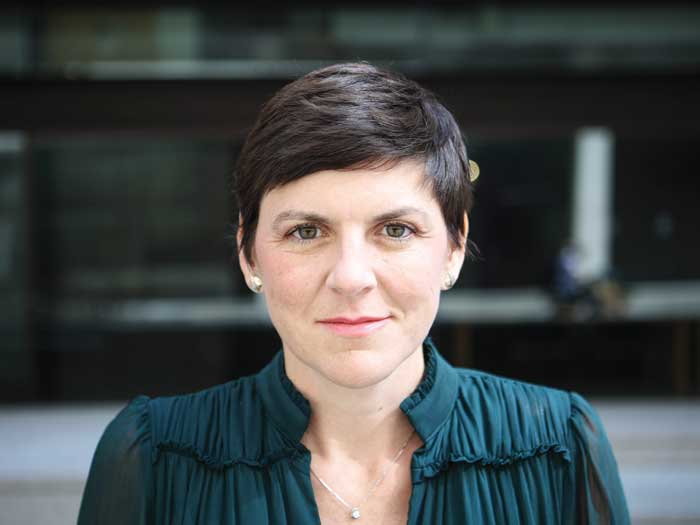 After facing down cancer, Jasmine Marcoux is providing support and inspiration to those who are waging their own battles with the disease (Portrait by Stephanie Foden)
After facing down cancer, Jasmine Marcoux is providing support and inspiration to those who are waging their own battles with the disease (Portrait by Stephanie Foden)
A lump in my breast, the size of a walnut, rolling around under my fingers. That’s what catapulted me into the world of cancer on December 14, 2020, at the height of the pandemic. After an online Christmas lunch with my accounting team, I made my way to an appointment with a surgical oncologist. Nothing could have prepared me for when the ultrasound revealed a small lesion.
Stunned by the news, I immediately called my family doctor, surprised that the hospital had already contacted them. When she uttered the words “breast cancer,” my thoughts went straight to my seven-year-old daughter. Was I going to die? “No,” the doctor replied. “You have a good prognosis for survival.” From then on, everything moved quickly.
I was 41 and had stage 2B hormone-dependent cancer. I would eventually have to undergo two surgeries, one of which would entail a double mastectomy—all in addition to four chemotherapy sessions every three weeks. Because of the pandemic, I would have to receive my treatments unaccompanied without the support that you’d normally expect. My partner, Jean-François, would have to drop me off in front of the hospital and pick me up afterward, when I would often be on the verge of passing out.
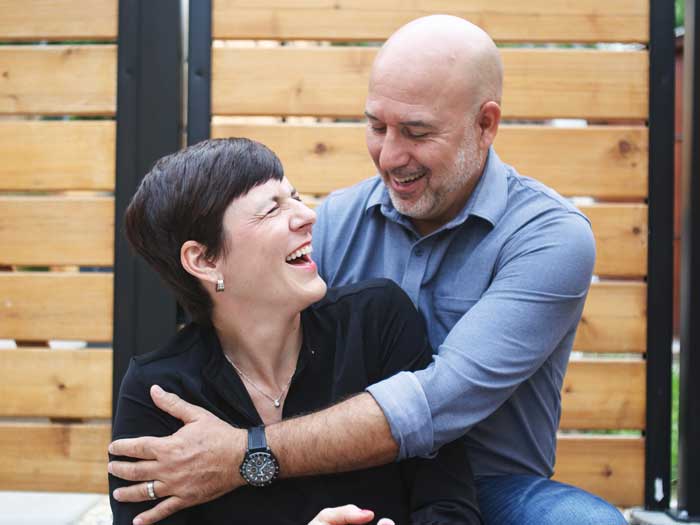 Jasmine Marcoux and partner Jean-François (Photograph courtesy of Jasmine Marcoux)
Jasmine Marcoux and partner Jean-François (Photograph courtesy of Jasmine Marcoux)
But I didn’t know any of that yet. All I knew, before being taken into the care of the nurses and doctors, was that I had no choice but to spend a long while in the nebulous world of cancer, not knowing if I was going to come back.
All at once, I was losing total control of my personal and professional life. It was a dizzying experience for the woman, the lover, the mother and the highly organized manager in me. Fueled by adrenaline, I went into survival mode. I did everything I could to get better: osteopathy, massage therapy, acupuncture and anything else that could help me regain a sense of control.
WAVES OF EMOTION
After my diagnosis, I went through different phases: anger, sadness, fear. Feeling alone and misunderstood, I knew I was hard to keep up with, to the point where, at times, I could hardly even stand myself. I was also touched by the flowers and gifts I received, yet was disappointed by how some people reacted to the disease. Only later did it occur to me that many felt truly helpless about how to deal with it. All this put a strain on my relationship with Jean-François, but at the same time, it also strengthened it.
I worried about introducing my daughter to cancer at such a young age. When I explained what was happening to me, Sandrine burst into tears. A few moments later, she asked, “Can we play, Mom?” And that was that.
Of course, I also wondered: “Why me? What have I done to deserve this? What do I need to change in my life?” A flurry of questions swirled in my head. Especially as I came from a family of women who had no personal experience of cancer. In the end, I came to accept that nothing could explain my cancer, even though it would be part of my life from then on.
FACING THE CHALLENGE, ONE HAIR AT A TIME
Chemotherapy often causes hair loss. And because of my type of cancer, I had up to a 12 per cent risk of permanent alopecia, which I was determined to avoid at all costs.
At my surgeon oncologist’s suggestion, I opted to use a cold cap—a helmet-like hat cooled to -3°C and worn before, during and after chemotherapy sessions. It constricts the blood vessels in the scalp so less of the chemotherapy drugs can reach the hair follicles, which dramatically reduces hair loss in most cases. Although still a little-known technique in Quebec, it’s been recognized and used for many across Canada for over 30 years.
Using an ice cap was a battle in itself. It needed to be worn 11 hours a day, and because it was so heavy and needed replacing every 25 minutes, I needed assistance. I fought hard to get the hospital administration to allow Jean-François to help me, at a time when the pandemic was causing a severe shortage of resources. Despite my exhaustion, I did not give up—Jean-François was there to aid with the cold cap up until the end of my chemo. And my determination paid off: I managed to keep most of my hair.
Since then, I’ve made it my cause while keeping in mind the painful statistic that eight per cent of women refuse chemotherapy for fear of losing their hair. This, I believe, has nothing to do with vanity. It’s one thing to know you are ill, but quite another to then see yourself in the mirror and in other people’s eyes. Portrayals of cancer patients tend to show people who are bald or wearing bandanas.
It’s time, I thought, to change the face of cancer, one hair at a time.
That is the aim of Keep Your Hair, a charitable organization I discovered at the start of my treatments. It all began when I met the charity’s vice-president, Sophie Reis, who introduced me to the founder, Sophie Truesdell-Ménard, one of the first women to use the cold cap in Quebec. With her cause being so crucial and relatable to me, I suggested we team up. Since then, I have been actively involved as administrator and brand ambassador alongside Truesdell-Ménard, Reis and Cléo Maheux—all of whom are also fellow breast cancer survivors before reaching their mid-forties. We are committed to educating, equipping and guiding the public so that they know cold caps are an option and easily accessible. And this is only the beginning—we have big plans to extend our reach. For example, we are working to make cold caps more readily available in Quebec hospitals. This is a right for all cancer patients. However, some hospitals are still reluctant, and the obstacles are many, although not insurmountable. That’s why we are also involved in political advocacy to bring about change. We’re actively seeking partners to support patients financially, as the costs associated with the cold cap are high.
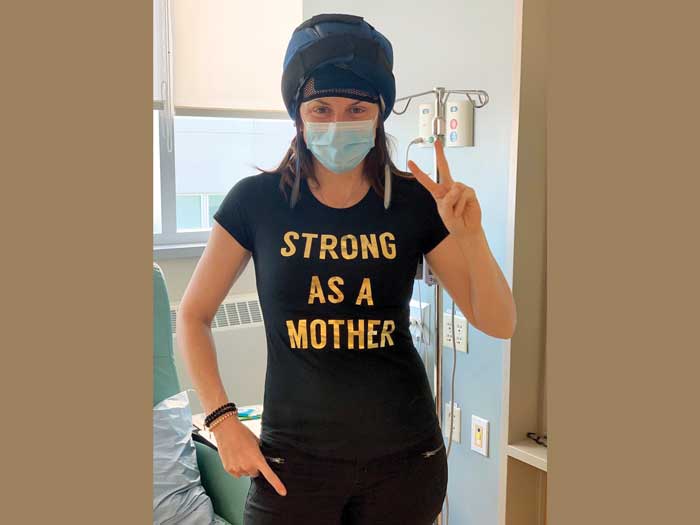 Marcoux wearing a cold cap ahead of her first chemotherapy treatment (Photograph courtesy of Jasmine Marcoux)
Marcoux wearing a cold cap ahead of her first chemotherapy treatment (Photograph courtesy of Jasmine Marcoux)
On a personal level, this mission takes up a lot of my time. Not only do I work closely with patients who use the cold caps—currently around 200 patients—informing, reassuring and encouraging them to continue, as the process of wearing a cold cap can be difficult for many, but I also hold numerous information sessions with hospital centres to raise awareness of the cold cap’s effectiveness and the challenges it presents. On top of that, I contribute to the organization’s website, which will relaunch by the end of 2023, and enthusiastically take part in major events, such as walks for cancer prevention and support for those affected by the disease. My daily commitment to the cause brings me great satisfaction.
THE AFTERMATH
After months of gruelling treatment, I showed no sign of the disease. When I learned on July 22, 2021, that I was in remission, I actually panicked. I know it’s strange, but all I wanted was to go back to the hospital the next day, because as long as I was there, the cancer could never return.
While everyone else wanted to celebrate the news, I wanted to curl up in a ball, because the real battle was beginning: I was alone with the memory of my cancer. I thought about it day after day, to the point that I convinced myself that I missed my cancer.
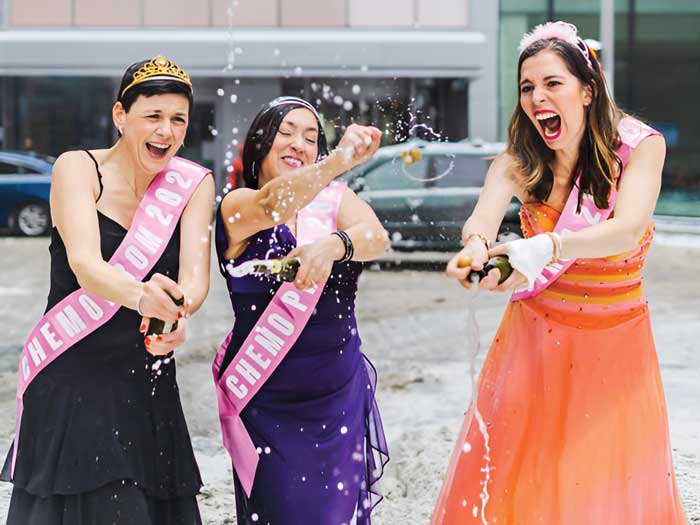 Marcoux and friends celebrating the end of treatment at “Chemo Prom 2022” (Photograph courtesy of Jasmine Marcoux)
Marcoux and friends celebrating the end of treatment at “Chemo Prom 2022” (Photograph courtesy of Jasmine Marcoux)
Too little is said about the aftermath of cancer and the conflicting emotions it brings. After the experience, I realized that it wasn’t the disease that I missed, but the huge impact it had on me. I got so used to the “new normal” of having cancer that I felt uncomfortable having to return to my old life.
RETURN TO ORDER
After a year on sick leave, and thanks to my very accommodating bosses, I was able to make a gradual return to my work. This 10-week transition period was essential because, for the first few days, I wasn’t really there at all. Unless you’ve been through it yourself, no one knows what it’s like to return to work after cancer. We underestimate the impact, especially on mental health. Cancer feels taboo. For example, when I returned to the office, everyone called my colleagues to find out how I was, but no one asked me directly. Then I started talking openly about what I’d been through, and the more I talked about it, the more barriers came down.
I soon started spreading the prevention message to my female colleagues. To this day, I remind them to do a breast self-exam and get a preventive mammogram, even if they have to fight for the right to do so. In Quebec, mammograms are only recommended for women aged 50 and over, so the exam is not easily accessible to younger women. This makes no sense, especially when you consider that hormone-dependent breast cancer—like mine—affects women in their twenties, and that around one in eight women will develop breast cancer in her lifetime. We need more prevention, which is another of my missions—one in which I’m deeply invested, albeit informally, in my professional and personal networks, as well as on social media where I post regularly to get the word out.
It is this desire to make an impact that inspires me and gives meaning to my professional life. I have been with the Order for almost 20 years and was promoted to the role of vice-president of qualification in October. I oversee the program, exams and training to become a CPA. I’m in the right place to have a positive impact on candidates and colleagues. As a manager, I would even say that the experience of having cancer has made me more sensitive to the challenges people face.
A NEW BEGINNING
These days, doctors don’t talk so much about curing cancer as putting it into remission. Can the disease really be cured? I won’t be able to say for sure for another five or 10 years. For now, I’m learning to live with this sword of Damocles hanging over my head. The fear never quite goes away, especially before my quarterly follow-ups. Since screening procedures keep me from having more frequent scans to put my mind at ease, as soon as a symptom crops up, I turn to my breast cancer sisters for support and reassurance, knowing that health professionals cannot address all our concerns.
Cancer is always an ordeal, but it also brings unexpected gifts. It has allowed me to meet wonderful people and discover new things about myself. During my “medical journey,” I was able to participate virtually in a study in the McGill University Health Centre Breast Clinic’s After Cancer Coaching program. As the name suggests, it teaches people how to bounce back from cancer, even when it seems impossible—something that should be offered to all patients. This training reinforced my desire to provide support by inspiring other patients. I have always loved playing the role of mentor, but I never thought that I would one day do it with women affected by cancer, especially through Keep Your Hair.
Today, giving back is part of my recovery. More importantly, it sheds light on who the new Jasmine will be: someone who will make an impact in every area of her life. It’s my way of transforming illness into something positive.
MORE ON GIVING BACK
Find out how other CPAs such as Carter Wilson are helping out in different ways in their communities. And learn why three CPA Canada volunteers find the work so rewarding.